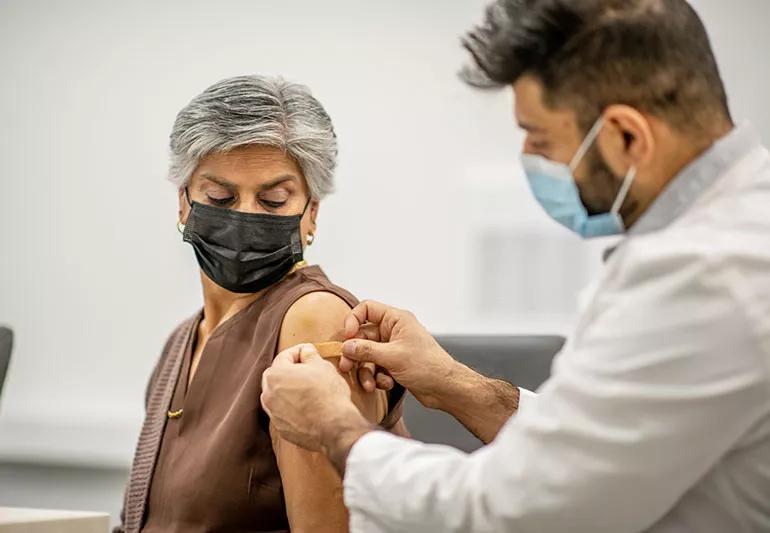Find out who needs protection the most

Every year, your doctor likely reminds you of the benefits of getting a flu shot. But there’s another vaccine you should discuss with your doctor, too — one that helps protect you from pneumonia.
Advertisement
Cleveland Clinic is a non-profit academic medical center. Advertising on our site helps support our mission. We do not endorse non-Cleveland Clinic products or services. Policy
While not a seasonal vaccine or as widely prescribed as the flu shot, the pneumococcal vaccine helps protect those most at risk for serious pneumococcal infections that can lead to complications, a hospital stay or even death.
“And in the age of COVID-19, it’s especially important to focus on the health and safety of your lungs,” says pulmonologist Anu Suri, MD, FCCP. For those who have preexisting conditions, even more so.
Pneumonia is an infection in one or both lungs that typically stems from several kinds of germs, most often bacteria and viruses.
Symptoms can develop gradually or suddenly, including:
Early detection is often challenging because many people with these symptoms assume they have a cold or the flu.
It’s important to also note that the vaccine helps protect against some — but not all — bacterial pneumonia.
“There are dozens of different types of bacterial pneumonia,” says Dr. Suri. “The vaccine will certainly reduce your risk of the most common bacterial pneumonia.”
The Centers for Disease Control and Prevention (CDC) recommends the pneumococcal vaccine for those who fall into the following groups:
Advertisement
The recommendations are sometimes confusing, so it’s a good idea to talk to your healthcare provider about your questions and concerns, Dr. Suri says.
And don’t wait to have that conversation. “This is an infection you see year-round,” she adds.
Again, it’s best to determine this with your doctor, but as a general rule, the CDC states you should not get the pneumococcal vaccine if:
There are currently two vaccines administered in the United States:
Just as with a flu shot, and now COVID-19 vaccines, some people believe that getting a pneumococcal vaccine will cause them to come down with the flu or virus, or experience long-term side effects.
“This is absolutely not true,” Dr. Suri says.
Not only will the pneumococcal vaccine help reduce the risk of contracting certain types of bacterial pneumonia, but it also guards against serious consequences resulting from the flu and severe infections, such as sepsis.
For young children, older adults, smokers and those with other risk factors, the vaccine is a healthy choice to make.
“I can’t see any reason to avoid this vaccine and every reason to get it,” says Dr. Suri.
Advertisement
Learn more about our editorial process.
Advertisement

Most recommended precautions center around minimizing bruising or swelling

Even one drink can have an impact on your cognitive function leading to slurred speech, blurred vision and impaired memory

Understand who may (and may not) benefit

Lorem ipsum dolor sit amet. Et odio Quis vel ipsam omnis eum alias deleniti et placeat impedit non voluptas galisum hic autem enim et cupiditate aliquid. Est beatae quidem non facilis autem ut commodi nisi aut tempore rerum et dolores voluptatem cum enim optio id sapiente quasi. Ad laboriosam officiis 33 cupiditate sequi ea voluptatum consectetur qui necessitatibus voluptate et quasi doloremque et facere explicabo quo explicabo officia

Seeking help through therapy can be an important step in improving your quality of life when you have UC

Type 2 diabetes isn’t inevitable with these dietary changes

Applying a hot or cold compress can help with pain